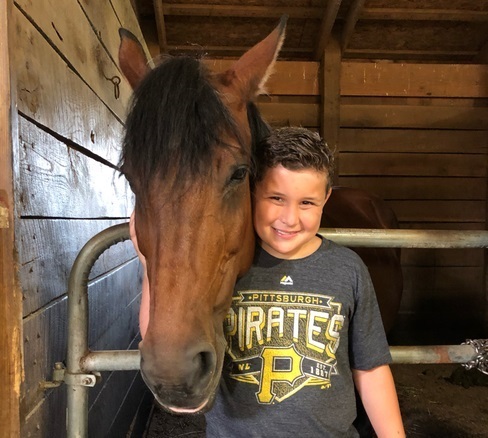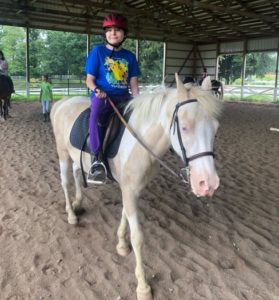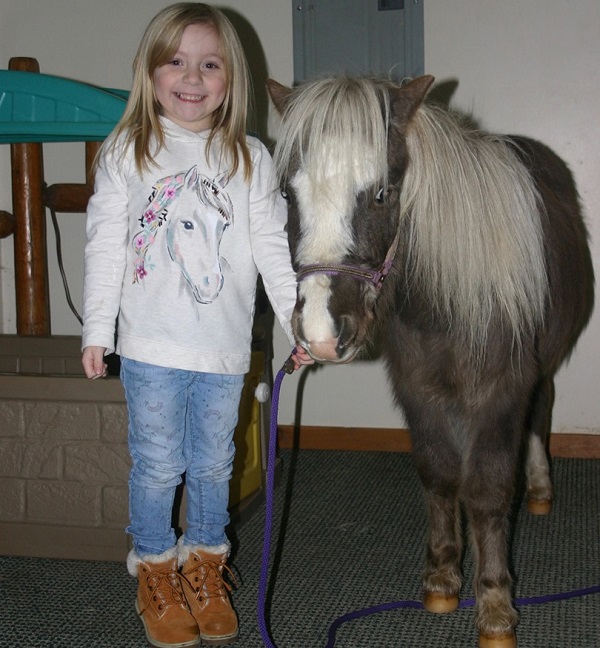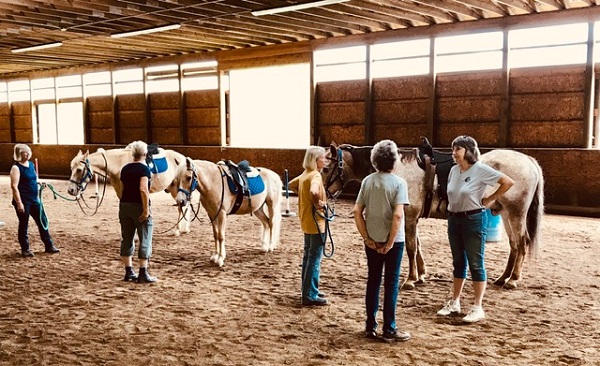For Pittsburgh kids with special needs, equine therapy is more than horseplay: It’s life-changing.
When Mason Markosky was born 14 weeks premature, he was left with brain damage and irreparable injury to his airway. Along with a diagnosis of Costello syndrome and cerebral palsy, his parents were told Mason was not likely to survive. Despite those odds, today he is 19 years old and capable of walking on his own. The remarkable change is due, in large part, to riding horses.
Mason’s healing process with horses began at age 3. Still unable to bend at the waist or perform simple motor skills, Mason’s parents enrolled him in hippotherapy, a physical therapy named after the Greek word for horse. A horse’s gait moves a rider’s hips and pelvis, facilitates breathing and strengthens muscle tone, which is an added bonus for kids with limited or no mobility.
His mom, Cat Markosky, was skeptical at first.
“He was so fragile,” she says. “I couldn’t even sit him up, let along put him on a horse. I went and watched a session with another little boy who was pretty intense, like Mason. I talked to the mom and she was telling me he was like a noodle and now he has all this core strength. All from riding a horse.”
Mason started riding twice a week. He was frightened for the first few months until he realized this activity wasn’t like a trip to the doctor’s office. It was supposed to be fun. Now he sits tall in the saddle, filled with pride and joy. By age 5, he could move about with a walker. By age 7, he took his first steps unassisted.
Mason’s experience led his parents, Michael and Cat Markosky, to found STAT Inc. Ligonier Therapeutic Center in 2007.
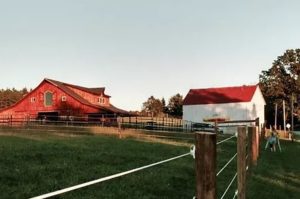
Mason’s younger brother, Max, benefited from equine therapy, too. For the first six years of his life, the autistic boy didn’t speak. Then one day, on the back of a horse, Max said his first words: “Go faster!”
Through the Equine Assisted Growth and Learning Association’s (EAGALA) therapy model, clients dealing with mental health issues such as depression, anxiety, or addiction can benefit simply by being near a horse out in the pasture. The animal serves as a metaphor for something going on in their personal life.
Cat discovered this while working toward her EAGALA certification in North Carolina. The instructor asked her to name one thing she’d like to change in her life.
The mother of three, two with special needs, wanted freedom.
She was told to enter the arena, where three horses were standing, and find it. Begrudgingly, she went around to each animal, noticing the different reactions she got from each one.
“I looked around the ring and realized that each one represented my kids,” she says. “It washed all of the resentment out of my body. That healed this huge piece of me. That’s how I fell in love with this therapy. I want everybody to feel the freedom that I felt that day.”
The Markosky’s STAT Inc. Ligonier Therapeutic Center is one of a number of programs in the Pittsburgh area offering equine therapy. Here is a sampling:
Glade Run Adventures
To keep her “employees” happy, Julie Wahlenmayer gives them plenty of time off, a serene work environment and enough hay and oats to keep their bellies full.
As director of Glade Run Adventures, an equine therapy program for people with mental and/or physical challenges, she manages nine horses, a miniature horse, a miniature donkey and a miniature cow.
Nestled on 300 acres of rolling pastures in Zelienople, the site is an outdoor classroom offering therapeutic riding lessons, equine-assisted learning, summer camps and an extended school year program. The facility serves adults and children, including nearly 300 students from 45 different school districts in the region. Most participants are on the autism spectrum.
Through their gentle, patient nature, horses help boost a person’s confidence, engage their senses and improve their communication and listening skills in a way that a traditional therapy session cannot. The program is certified by the Professional Association of Therapeutic Horsemanship International (PATH Intl.) as well as the EAGALA.
The animals are evaluated daily to make sure they’re up for the job.
“Just like any other work relationship, if your partner is off, you have to question why,” says Wahlenmayer, who holds a Master’s degree in Community Mental Health Counseling, is a Nationally Certified Counselor and holds a number of equine therapy certifications. The horses “have to have the desire to do this work.”
Glade Run Adventures, an off-shoot of Glade Run Lutheran Services, hosts about 30 classes on a six-day rotation, giving kids hands-on experiences that are both fun and educational.
The social skills they learn in the barn can be put into practice at home.
Glade Run Adventures has offered equine therapy for two decades and interest in it continues to grow. Kids are responsive to the program and look forward to each session, even if they started their adventure wary of the situation.
“I’ve always recognized the benefits. Sometimes you have participants who don’t want to be here because they feel the world is awful and everything is hard,” Wahlenmayer says. “This is where they grow and make friends.”
Lovebug Therapeutic Horses
Sometimes good things come in small packages.
Lovebug Therapeutic Horses, a nonprofit organization providing emotional support services to people through equine interactions, has several four-legged staff members who measure 3 feet or smaller.
Unlike ponies that have shorter legs, wider barrels and thicker necks, minis are just scaled-down versions of their full-sized brethren.
Owner Lisa Dapprich visits nursing homes, shelters, schools and public events in the area with minis such as Jimmy Cricket, Tashie, Rocky and Princess Lily. Petting and grooming the animals can help calm children and adults with autism, developmental delays, hyperactivity, mental health or behavioral issues and geriatric conditions.
Interactions are limited to an hour, so the minis don’t get overworked and kids don’t get overzealous. (They’re hard to resist when they’re all dressed up in costumes and bows).
Riding for the Handicapped of Western Pennsylvania
Every Monday and Thursday from May through October, there’s magic happening in North Park.
At Parkview Stables on Grubbs Road, Riding for the Handicapped of Western Pennsylvania provides equine therapy to more than 100 kids ages 3 to 18 emotional mentally and physically challenged. In the process, the organization creates unbreakable bonds between man and beast.
The animals might as well be unicorns!
“The movement of the horse has a calming effect on kids,” says director T.M. Abbott, who became a volunteer for the organization in 1979.
During a 45-minute session, riders are loaded onto their horses with the assistance of a mounting block. A three-member team of certified instructors mans the front and sides of each horse. The class starts with a warmup around the arena, followed by fun activities, such as weaving in and out of cones.
There are 10 horses, all males, residing at the stable. Some geldings have been with the program for 25 years. Eventually, they retire and spend their golden years getting lots of R&R. Most of them have been donated to the program by good Samaritans who recognize the benefits of equine therapy. RHWPA is funded exclusively by donations, fundraising and grants.
Founder Maria Keim witnessed the magic of therapeutic horse riding while vacationing in England during the late-‘70s. Upon her return to the states, she decided to provide the service to local kids.
Today, RHWPA provides services to 74 kids from Allegheny and Butler counties. There is a waiting list of up to two years, but a little patience pays off.
“Despite their disability,” Abbott says, “riders gain self-esteem and confidence.”
